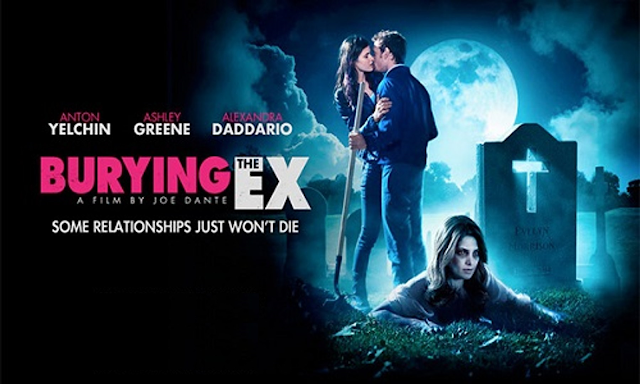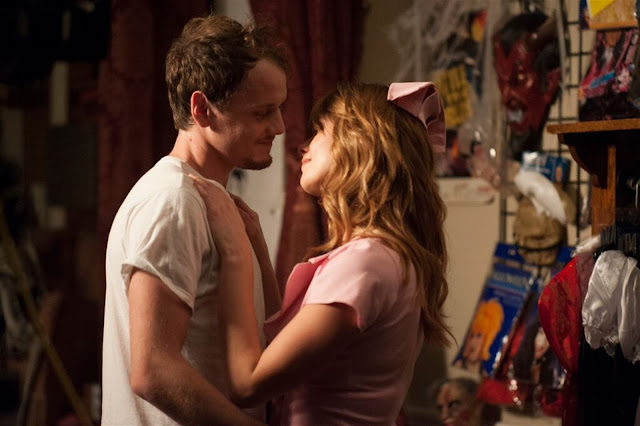
Max (Anton Yelchin) has a problem. His girlfriend of many years, Evelyn (Ashley Greene), is driving him crazy, and for the longest time he has stalled in breaking things off because he didn't have the guts to do it. One day a bus changes all that - by knocking Evelyn out of her shoes and the life out of her body, allowing Max time to sigh in relief and grow close and cozy with Olivia (Alexandra Daddario), the punky and quirky malt shop owner/operator. Things seem to be going pretty well...until Evelyn inexplicably rises from the grave and returns home, hornier and gooier than ever, leaving Max in an even worse conflict: not only is she back to make his life hell, she's now a member of the living dead. He once promised her they would be together forever, and she was going to hold him to it.
As you can imagine, brains jokes.
Burying the Ex was the third comedy of 2014 to mix teen love and zombies, following on the heels of the superior but uneven Life After Beth and the well-meaning but dull Warm Bodies. Why this is so disappointing is because Burying the Ex is the latest feature effort from beloved genre filmmaker Joe Dante, he of the cult classics Gremlins and The Howling, whose involvement should have resulted in a slam dunk. Though an overused concept, if anyone was going to waltz in and do something unique with it, surely it would have been him, as his sensibilities as a storyteller and talent as a filmmaker have set him off from his colleagues during his entire career. But it's the broadness of the film's comedy and the unoriginality of the conflict that stunts his ability to infuse it with his identity, thus robbing us of a new Joe Dante film and leaving us with yet another forgettable title in the "uh oh! zombies!" sub-genre.

After 2003's Looney Tunes: Back in Action, Joe Dante took a long break from feature film-making, only returning in 2012 for the solid genre effort, The Hole. However, that didn’t mean he was taking all that time off from directing, as he also contributed the episodes “Homecoming” and “The Screwfly Solution” for the short-lived Masters of Horror, as well as a segment in the horror anthology Trapped Ashes. Generally, when a director is missing from the feature-film game for that long, the eventual next output isn’t normally great. (See John Carpenter's The Ward.) The Hole, which played film festivals for a long time, struggled to find national distribution, and that didn’t bode well, either. But The Hole would go on to prove that not only was the film worth the wait, but that Dante was able to buck that trend and prove one thing: time away didn't necessarily mean he was off his game.
Much as it pains me to say, perhaps Mr. Dante should have stayed away just a bit longer this time around.
Burying the Ex just might be Dante's broadest comedy yet (this being a director who's made a Looney Tunes movie), and it's almost entirely the fault of the screenplay, which relies on obnoxious humor, cliched situations, and tired dialogue. When you can sense what line any particular character is going to utter, or guess the punchline to the groan-inducing joke soon to come, you'll know you're in the presence of a story that's not trying to break new ground, nor trying to find new ways to entertain.

This is probably the most disappointing aspect, as the film's concept alone is well within Dante's wheelhouse, it being a marriage of horror and comedy, and not afraid to get a little bloody. What it is afraid to do is go for earned laughs. Instead, we see the same recycled gags set to a musical score by Joseph LoDuca (the Evil Dead trilogy) that telegraphs ahead of time what you should find funny or pensive, dramatic or horrifying - and it all sounds cheap.
The cast manages to turn in varying work. Yelchin as Max comes off as likable, as he usually does, but there's something about his performance which suggests he doesn't quite understand the kind of film he's making, or the sensibilities of his director. A subdued performance in the midst of this madness causes the audience to constantly reel back, unsure of how they're supposed to be feeling and what exactly they're experiencing. Greene, on the other hand, embraces her role to maximum effect. Even before she's laid to rest, her Evelyn is overly peppy with quixotic expectations - the cause of her and Max's relationship issues in the first place. She's a green-going liberal to the analth degree, quipping about fluorescent light-bulbs and food additives and vegan tofu. It's mildly amusing until you realize the film is cheating by manipulating its audience into disliking her, transforming the conflict from torn young love - a conflict of substance worth exploring - into something akin to "Run, my zombie ex-girlfriend will bite you!" Daddario, perhaps most recognizable from her role as your heart attack in HBO's stellar first season of True Detective, plays the horror-comedy version of Garden State's Natalie Portman, in that she's bubbly and strange and adorable - an outwardly positive and enthusiastic person, and the kind of character with whom you can't help but fall in love, until you realize that a girl that beautiful who shares all your same interests and still has her baby teeth and somehow owns her own malt shop only exists in the movies. Max and Olivia's ensuing romance is the only aspect that drives the story forward and makes it interesting - and this in a film about a zombie ex-girlfriend at home falling apart in the bathtub.

As a director, Joe Dante has always been successful at “the Joe Dante aesthetic,” and it’s something he’s been rightfully exploiting ever since his first major blockbuster, 1984’s Gremlins. He has the ability to create something that, on the surface, seems to appeal to the younger demographic, but offers a bit more bite than that audience might be anticipating. His films exist somewhere in a chasm between children's fare and adult entertainment. In the Gremlins films, you have the adorable Gizmo as that conduit to perceived accessibility, though little mutants are soon shoved down garbage disposals while elderly women are heaved out windows. In The Hole, early-teen characters are facing their fears head-on, some childlike in their appearance, and some based on some very real-world dangers. But Dante isn’t satisfied with just creating something and presenting it to his younger audiences on a platter; instead, he wants to take his concepts and up them, just a little, beyond his audience's normal comfort level. He wants to challenge them, just a little bit, more than his creative colleagues. He wants “his” children to face facts and understand that this world contains real dangers, and though he may rely on typical horror tropes to establish this, that doesn’t make them any less relevant or emotionally affecting - or any less funny, which, as they say, tragedy often is. Burying the Ex is unique in that it's Dante's first R-rated film since 1981's The Howling, which is surprising considering his Masters of Horror efforts are quite brutal...and yet, meanwhile, Burying the Ex is not. In fact, beyond one scene of violence, the rating is befuddling, as the film comes off as rather tame and closer to his line-straddling aesthetic, only this time, instead of a boundary-pushing coming-of-age, it's a somewhat lame and toothless film geared toward, well, no one specifically.
Burying the Ex feels like one big missed opportunity. It's one thing for a film to be disappointing, but that disappointment is worsened when it comes from a filmmaker so highly revered in the horror community and who has consistently proven to be capable of so much better. A new film from the likes of Joe Dante will always bring with it a certain amount of expectation, which has been fully earned, but as Burying the Ex has proven, sometimes an intelligent director can make something without any braaaaaaaains.


No comments:
Post a Comment